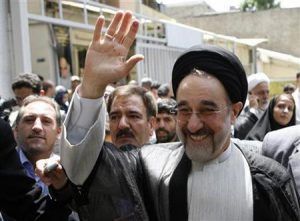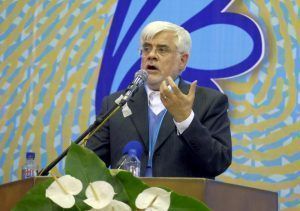A group of 100 journalists and reformist politicians has sent a letter to former Iranian President Mohammad Khatami (1997-2005) declaring that efforts to improve the country’s political system in the past 21 years have failed and that it is time to “reform the reforms.”
The letter reads: “The 2nd Khordad (reform) Movement is all but dead on its 21st anniversary. It has succumbed to external pressures. Also, many people have lost faith in the reforms, because the movement has failed to implement meaningful and lasting social and political changes in the country. We must look for other ways to bring about change. Any improvement in the volatile and dangerous present atmosphere will entail great hardships for the country and the nation.”
The letter is in two sections, each listing the weaknesses of the reform movement. The first part highlights some of the factors that have prevented progress:
- An incoherent system of political reforms
- The absence of a central body to manage change.
- Lack of transparency.
- Uninformed members.
- Severe issues in selecting candidates for the fifth city council elections.
The signatories to the letter have expressed concerns about the “ineffective and weak” composition of the Council for Coordinating the Reforms Front and the High Council for Reformist Policy under the leadership of Mohammad Reza Aref.
“We fear that even you won’t be able to generate interest among voters. We, therefore, hope that the leadership of the movement will address these pressing issues before the 2019 and 2021 elections. Unfortunately, the current political trend does not strengthen the reform movement, and in fact, it is moving in the opposite direction,” the letter warns.

The second part of the letter lists the fundamental weaknesses of the reform initiative:
- The conservative faction has gained the upper hand in the battle for control of the reform movement.
- A small group of self-promoting and corrupt politicians has created a reformist faction with no “clear plan” and lacking a “coherent platform.”
- Unfortunately, many of the bureaucrats and conservative reformists care more about protecting their positions than instituting change.
- The High Council for Reformist Policy, which was meant to be a place for pro-democracy politicians, has instead become a permanent home to the conservative government bureaucrats and technocrats.
The public has lost faith in the credibility, effectiveness, role, and relevance of the High Council for Reformist Policy.
“Political progress must rely on an institution rather than a person, because it may not be possible to benefit from your valuable experience continually,” the signatories to the letter reminded Khatami. “We, therefore, expect you to play a key role in shaping the political structure of the reformist movement, so that those in charge of setting its policies are true reformists and nationalist activists. That’s the only way that the organization can navigate through these dangerous waters.”
“You must, first and foremost, prevent reformism from morphing into conservatism,” the signatories have warned Khatami. “Secondly, the High Council for Reformist Policy must pave the way for the development of a national reform entity that unites reformists and promotes transparent and democratic elections. The move would be the first step towards mending the reforms.”
Many of the signatories to the letter are the same political activists who refrained from supporting the nationwide protests in December 2017. At the time, many of them instead posted messages of support for Khatami on social media using the hashtag “#I’m a reformist.” They believe that the reformists are the only hope for establishing democracy in Iran at the exclusion of all other groups.
Yet the same people are calling for a fixing of the reforms as a matter of great urgency. They believe that they can no longer benefit from “Khatami’s invaluable social and political experience.” Most of the signatories are not decision-makers in the reformist movement, but rather, are reform activists. The names of senior members of the reformist Islamic Iran Participation Front — such as Mostafa Tajzadeh and Mohammad Reza Khatami — are conspicuously missing from the list of signatories,.
Among the signatories is Emad Bahavar, the head of the youth faction of the Freedom Movement of Iran (FMI), who recently launched the “#normalization” hashtag in support of the reformists and of Khatami. It seems that he was one of the principal authors of the letter, because it includes some of his tweets.
On June 9, Bahavar tweeted: “The High Council for Reformist Policy must be a place for pro-democracy activists. Instead, it has become a permanent home to conservative government technocrats and bureaucrats whose main concern is to please the state and maintain good relations with the establishment.”
On June 16, the Jameh Irani (www.jamehirani.ir) news website published an interview with the secretary-general of the FMI, Mohammad Tavasoli, in which he said: “We must reform the reforms.”
“Reformists should promote community-based reforms,” he added. “Yet in the past two decades, many have joined the movement for the sole purpose of exerting power.”
Parts of the letter to Khatami are identical to Bahavar’s tweet and Tavasoli’s comments. The signatories are hoping to influence the nature and direction of the reforms. Yet at no point in their arguments do they offer an explanation for Khatami’s failure to institute meaningful changes during his eight years in office. The reformists controlled both the executive and the legislative branches of the government from 1997 to 2005, yet were unable to improve the country’s social and political structure. They now expect Khatami to step in and rescue the reform movement, which both the conservatives and the public believe is all but dead.
Some people argue that the letter is more about trying to sideline Khatami than “reforming the reforms.” Nationwide unrest in December 2017 by ordinary Iranians who felt betrayed by the government of President Hassan Rouhani was a wake-up call for the reform movement. New and tougher U.S. sanctions will most likely place great economic pressure on the country and the nation. The concept of “reforming the reforms” could be a campaign slogan for reformist politicians who intend to run in 2019 and 2021 elections. Criticizing the High Council for Reformist Policy seems to be the first step in the campaign.
One of the signatories of the letter is Abdollah Momeni, a pro-democracy activist and a former spokesman for the Alumni Association of Iran (an organization that focuses on the enforcement of democracy and human rights protection). Mr. Momeni lambastes the High Council for Reformist Policy in an op-ed in June 13 issue of the Sharq newspaper entitled “A Look at the Democratic and Reformist Policy.”
“Following the nationwide protests in December, many people have come to question the strategy of the reform movement,” Momeni said. “There are many unanswered questions — for instance, why the Sunni Friday prayer leader of Zahedan, Abdolhamid Ismaeelzahi, is not a member of the High Council for Reformist Policy.”
Meanwhile, various factions within the reform movement have been fighting each other in the press, particularly in the Sharq and Qanoon newspapers. Among other issues, the two sides have been arguing the “Success and Failure of Reforms” and “Reformism and Secularism.” All factions have criticized both Aref and Khatami. Some speculate that Aref plans to form a new political party.

In an editorial on June 13, the reformist “Didehban” (www.iranchamber.com) news website has criticized the signatories to the letter to Khatami. “Mohammad Reza Aref is not the problem. It’s you. All 100 of you,” the editorial said. “It is astonishing how the same people try to distance themselves from the causes of the public’s anger and discontent by repackaging themselves so that they can continue as before.”
“There is no doubt that Mr. Aref has been an ineffective leader,” the editorial noted. “It is common knowledge that Aref couldn’t stand up to the influential members of particular factions within the reform movement. Yet after the December unrest, the same people tried to defuse the situation by raising or lowering the number of people in the High Council for Reformist Policy and shifting the blame for their colossal failure to others. Political activists know that Aref is not the problem, but rather it is the reformists, including the 100 people who wrote the letter to Khatami.”
It is abundantly clear that the reform movement is still searching for its identity and political vision. On the one hand, it is trying to survive an attack from the loyal opposition, and on the other, it is hoping to appease an angry and disillusioned public which has lost faith in reformists and conservatives alike. The only thing they can think of under these dire social, political and economic circumstances is to call for “reforming the reform!”
These 100 activists should have addressed the letter to the Iranian people and not Khatami if their real intentions were to improve the current political climate and not to position themselves for the 2019 and 2021 elections.
[Translated from Persian by Fardine Hamidi]

